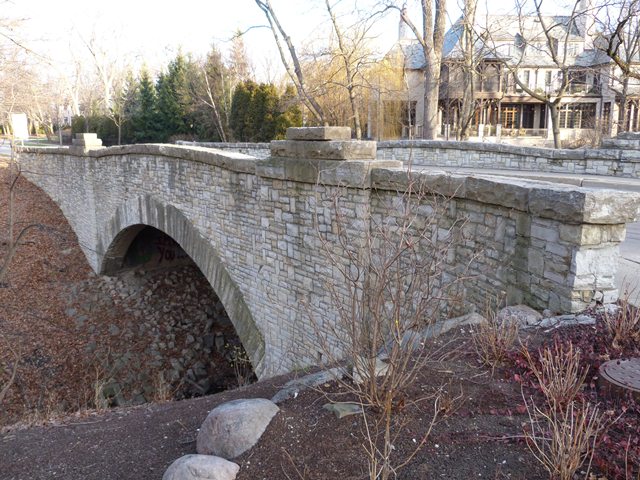We Recommend:
Bach Steel - Experts at historic truss bridge restoration.
BridgeHunter.com Phase 1 is released to the public! - Visit Now
Hawthorne Bridge

Primary Photographer(s): Nathan Holth
Bridge Documented: December 13, 2012
Glencoe: Cook County, Illinois: United States
1979
55.0 Feet (16.8 Meters)
61.0 Feet (18.6 Meters)
30 Feet (9.14 Meters)
1 Main Span(s)
16061904280

View Information About HSR Ratings
Bridge Documentation
View Archived National Bridge Inventory Report - Has Additional Details and Evaluation
View The Design Plans For This Historic Bridge
About The Sheridan Road Trio of Bridges
This bridge is one of three bridges of similar design but varying spans and lengths on this section of Sheridan Road in extreme northern Cook County. These are Stone Bridge, Newhall Bridge, and Hawthorne Bridge. The bridges are designed to look like stone arch bridges when in fact they are not. The arches that are readily visible on these bridges are actually thin concrete arch ribs located on each side of the bridge that hold carefully arranged stones in place to create a stone arch bridge appearance. In between these concrete/stone arch ribs is the actual superstructure of the bridge. The superstructure as originally built consisted of a concrete t-beam design, which was a mainstream bridge type when these bridges were built. However these superstructures were replaced in 1979 with steel stringer superstructures. In this sense, the original bridges themselves were demolished and replaced with new bridges. As such, from a technical standpoint, the only parts of these bridges that are of interest from a historic bridge standpoint are the decorative arches and the substructure (piers and abutments), which remain original. Despite the replacement of the bridge superstructures, the arches and substructures appear to retain excellent historic integrity and do not appear to have been altered. The arches continue to function as originally intended which was to hide a mundane structure with an attractive facade. Despite their function as decoration only, the masonry is still quite impressive and it appears considerable effort was made to make these arches look authentic in appearance. The stone is described in the original design plans as "Buff Bedford Stone Masonry." The railings of the bridges also remain in original condition. These bridges are relatively early examples of the practice of hiding an uninteresting bridge type with non-functional frills and decorations. The practice is extremely common today in "context sensitive" bridge design since nearly all modern bridges lack aesthetic quality of any kind, and the only way to make them look anything less than ugly is to conceal the actual bridge or add excessive non-functional decorations.
About This Bridge
This bridge is listed on the original design plans as "Hawthorne Bridge." This is the smallest of the three bridges on Sheridan Road. It has only one span instead of three like the other two bridges.
![]()
Historic Bridges of Chicago and Cook County


Chicago and Cook County are home to one of the largest collections of historic bridges in the country, and no other city in the world has more movable bridges. HistoricBridges.org is proud to offer the most extensive coverage of historic Chicago bridges on the Internet.
General Chicago / Cook County Bridge Resources
Chicago's Bridges - By Nathan Holth, author of HistoricBridges.org, this book provides a discussion of the history of Chicago's movable bridges, and includes a virtual tour discussing all movable bridges remaining in Chicago today. Despite this broad coverage, the book is presented in a compact format that is easy to take with you and carry around for reference on a visit to Chicago. The book includes dozens of full color photos. Only $9.95 U.S! ($11.95 Canadian). Order on Amazon.
Chicago River Bridges - By Patrick T. McBriarty, this is a great companion to Holth's book shown above. This much larger book offers an extremely in-depth exploration of Chicago's movable highway bridges, including many crossings that have not existed for many years. Order Now Direct From The Publisher! or order on Amazon.
View Historic American Engineering Record (HAER) Overview of Chicago Bascule Bridges (HAER Data Pages, PDF)
Chicago Loop Bridges - Chicago Loop Bridges is another website on the Internet that is a great companion to the HistoricBridges.org coverage of the 18 movable bridges within the Chicago Loop. This website includes additional information such as connections to popular culture, overview discussions and essays about Chicago's movable bridges, additional videos, and current news and events relating to the bridges.
Additional Online Articles and Resources - This page is a large gathering of interesting articles and resources that HistoricBridges.org has uncovered during research, but which were not specific to a particular bridge listing.
![]()
Photo Galleries and Videos: Hawthorne Bridge
Bridge Photo-Documentation
Original / Full Size PhotosA collection of overview and detail photos. This gallery offers photos in the highest available resolution and file size in a touch-friendly popup viewer.
Alternatively, Browse Without Using Viewer
![]()
Bridge Photo-Documentation
Mobile Optimized PhotosA collection of overview and detail photos. This gallery features data-friendly, fast-loading photos in a touch-friendly popup viewer.
Alternatively, Browse Without Using Viewer
![]()
Maps and Links: Hawthorne Bridge
Coordinates (Latitude, Longitude):
Search For Additional Bridge Listings:
Bridgehunter.com: View listed bridges within 0.5 miles (0.8 kilometers) of this bridge.
Bridgehunter.com: View listed bridges within 10 miles (16 kilometers) of this bridge.
Additional Maps:
Google Streetview (If Available)
GeoHack (Additional Links and Coordinates)
Apple Maps (Via DuckDuckGo Search)
Apple Maps (Apple devices only)
Android: Open Location In Your Map or GPS App
Flickr Gallery (Find Nearby Photos)
Wikimedia Commons (Find Nearby Photos)
Directions Via Sygic For Android
Directions Via Sygic For iOS and Android Dolphin Browser
USGS National Map (United States Only)
Historical USGS Topo Maps (United States Only)
Historic Aerials (United States Only)
CalTopo Maps (United States Only)


